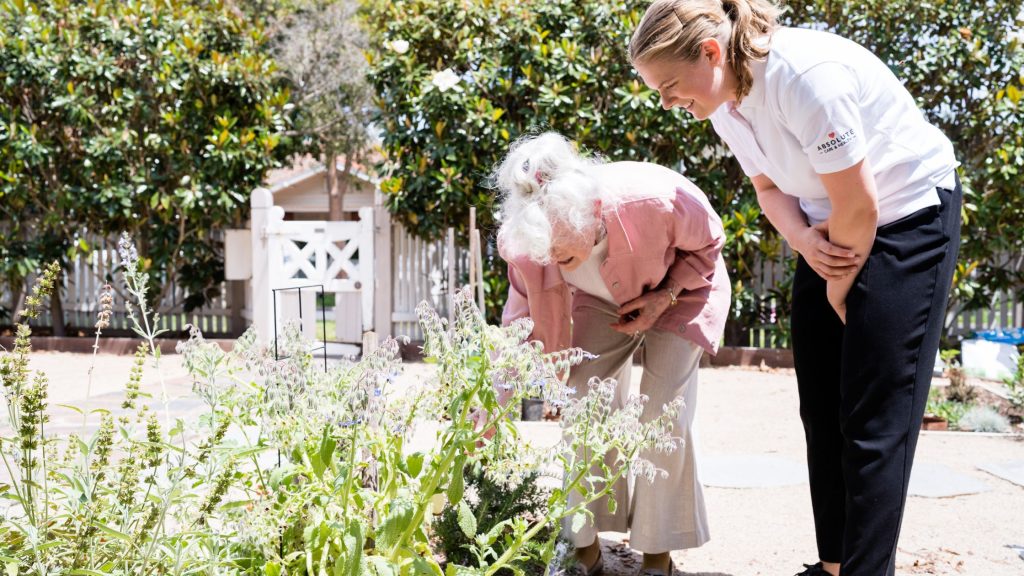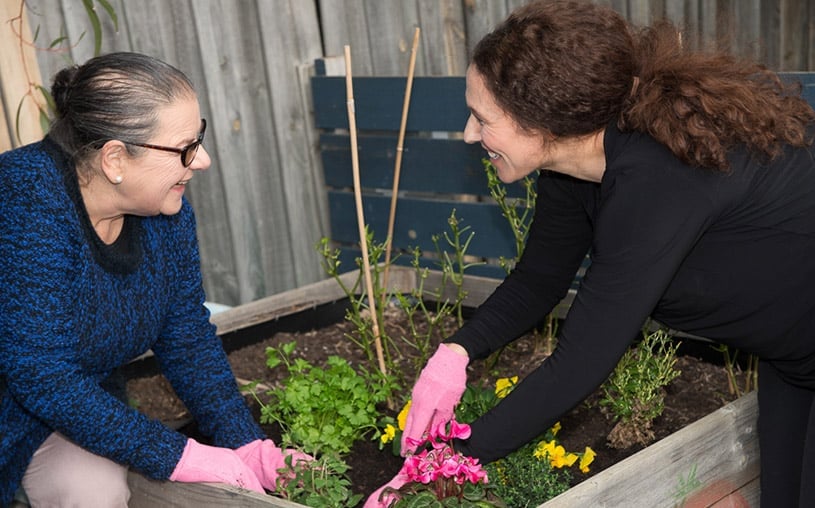It’s no secret that maintaining one’s independence and living in the comforts of one’s home remain the top priority and desire for most seniors. Fortunately for Australians, we have the Home Care Packages program (HCP) – part of the Aged Care support system – that stands out as a valuable resource for individuals wishing to age in place while receiving the necessary support and care.
These packages, funded by the government, are designed to support the quality of life for seniors and empower them to maintain their independence and wellbeing through the provision of a range of support services and goods tailored to individual needs.
Many may wonder – What can Home Care Package funds be used for? It’s key for Package recipients and their families to understand so they can make informed decisions and get the most out of it.
In this article, we will explore the versatile range of services and assistance that these funds can deliver to enhance the quality of life for senior Australians. Before we go into all that though, let us delve into what exactly is a Home Care Package first.
Home Care Packages Explained
A Home Care Package is basically a coordinated and flexible support program that the government funds to assist older individuals to maintain their independence and wellbeing while living at home so that they don’t have to move to a residential aged care facility (a nursing home).
It focuses on individualised care plans, giving recipients the freedom to choose their care providers and services that range from personal care, allied health and nursing to domestic assistance and gardening. From delivered meals to essential home modifications or from companionship and social support to transportation. Such a person-centered approach enables one to receive personalised support that aligns with their unique preferences and circumstances.
Funds are not infinite though, which is why meticulous planning is necessary to get the most out of this program.
How Does Home Care Package Funding Work?
The HCP program offers funding based on assessed care needs ranging from Level 1 to Level 4, the higher of which addresses more complex requirements.
| Funding Level | Care needs | Approximate government funding |
|---|---|---|
| Level 1 | Basic care needs | $10,588.65 |
| Level 2 | Low-level care needs | $18,622.30 |
| Level 3 | Intermediate care needs | $40,529.60 |
| Level 4 | High-level care needs | $61,440.45 |
The government contribution changes on 1 July every year; these figures are up to date as at 1 July 2024.
The first two levels support people with basic and low level of care needs. As the level goes up, the program caters to individuals who require a greater level of assistance due to chronic health conditions, disabilities, or advanced aging.
If you or someone close to you needs more assistance, you might qualify for extra funding that offers more support for individuals with certain conditions. For example, the dementia and cognition supplement is available to help cover the expenses of caring for those with moderate to severe cognitive issues caused by dementia or similar conditions.
Once you are approved for a Home Care Package, you’ll also be assigned to an HCP level. The amount of funding can then be used to deliver the care services to you.
You’ll need to plan out your care with your Provider, focusing on your goals and what you need to achieve them. Your provider is key because they then make your care plan happen, managing your budget to make sure the money is spent right on the things you agree on. Your Provider must also give you monthly Statements to keep you and your family in the loop about what has been spent on what services and supports.
Flexibility of the HCP
One good thing about the HCP is its flexibility. Starting from your care plan – you don’t have to conform to any predetermined settings. Plan it exactly the way you want it to be according to your goals and needs (of course there are some rules about what the money can be spent on. It won’t fund a summer holiday or a complete bathroom renovation!). If circumstances change along the way, work with your Care Manager to adjust it accordingly.
You’re free to pick any care provider you like so long as they are a Registered HCP provider. So take your time to find one that fits you best. Just make sure they can deliver the services that match what you need and want, as not all providers have the same options, especially for more complex care. Also, remember that your Home Care Package (HCP) fund can move with you if you decide to switch to a different approved provider later.
At Absolute Care & Health, ongoing monitoring and reviews are conducted regularly to ensure your care plan remains relevant and effective. In the event that certain aspects are no longer applicable or if your needs change, we will support you to make adjustments to your care plan so that your new circumstances can be reflected accordingly.
Who Is Eligible for Home Care Packages?
Eligibility for a HCP is determined through an assessment process conducted by the Aged Care Assessment Team (ACAT).
To be eligible for an HCP, you must generally meet the following criteria:
- Age Requirement: be 65 and over, or 50 and over for Aboriginal and Torres Strait Islander people
- Australian Residency: applicants need to be living in Australia and be either an Australian citizen, a permanent resident, or have applied for a permanent residency
The ACAT will conduct a comprehensive assessment at your home to determine your care needs, health, mobility, and the level of assistance required for daily living. This assessment will determine the HCP level that you will be approved for. After the Assessment, you may need to wait a few months before your Package is allocated. There is a national wait list, with priority access given to individuals with higher care needs or those experiencing particular challenges.
How Much Does It Cost?
While the HCP is technically a form of government funding and everyone who is eligible and approved for a Package will receive government funding, it doesn’t mean that it is completely free for everyone. You may be expected to contribute something towards the cost of your care if you can afford it. There are two types of contribution you could be asked to make:
-
- A basic daily fee – up to $12.53 per day (as of 20 September 2023). Based on your HCP level, your provider may ask you to pay this basic daily fee. However, in reality, the vast majority of providers do not require you to pay this. It does not change the amount the Government will pay.
- An income-tested care fee – This is a co-contribution that you may be asked to pay if you are a self-funded retiree or a part aged pensioner (full age pensioners will not be asked to pay this). The amount you pay will depend on your level of income. The maximum you can be asked to pay is $35.95 (as of 20 September 2023). You may need to undergo an income assessment conducted by the Services Australia to work out exactly how much you need to contribute. If you have to pay this fee, know that there are caps and lifetime limits on how much you can be asked to pay to ensure that costs are reasonable and manageable for you.
- Additional fees These would apply if you choose to have extra care and services that are not covered by the HCP program or more services than your HCP budget can pay for. This should be agreed with your Care Manager in advance.
And this brings us to the core of our article – what is, and is not covered by the HCP?
Home Care Package Inclusions and Exclusions
The specific inclusions of a Home Care Package vary based on an individual’s needs and the level of the package assigned. Nevertheless, common inclusions usually encompass the following:
- Personal care: bathing, grooming, dressing, mobility support etc.
- Nursing services: medication management, wound care etc.
- Domestic assistance: cleaning, laundry, meal preparation, grocery shopping etc.
- Allied health services: services from physiotherapists, occupational therapists, speech therapists etc.
- Social support: companionship, assistance with social activities, support to maintain social connections
- Transportation: for medical appointments, grocery shopping, other essential outings
- Home modifications and equipment: to enhance accessibility and safety, assistance with obtaining necessary equipment or aids
- Light / basic gardening: to maintain safety in your home
- Respite care: temporary relief for family members or primary caregivers (to allow them to take a break from their caregiving responsibilities)
- Telehealth services: remote health monitoring and consultations, where appropriate
When setting up your Home Care Package (HCP), you and your care provider will decide together on the services that are right for you. This means you can pick the services that best match what you need.
This brings us to the exclusions and limitations of the HCP that you need to be aware of. In short, you can understand it as such: everyday expenses that are not related to your care needs will not be covered. Likewise, anything that would normally be purchased out of your income will not qualify for funding. Items and services that are funded by the Government in other ways such as the cost of medicines that are on the PBS.
Here’s what’s excluded in general:
- Rent or mortgage/accommodation costs
- Home modifications beyond what is necessary for accessibility / care needs
- Groceries and food
- Utilities or bills
- Travels or holidays
- Medication/pharmaceuticals
- Medical care expenses/hospital services
- Services already covered by other programs
- Entertainment and leisure activities (e.g. club memberships, tickets to sporting events)
- Large capital purchases (e.g. property, vehicles, major home renovations)
- Services not agreed upon in the Care Plan
As you can see, the exclusions are not always entirely clear-cut here. What may seem like a clear exclusion – food – can actually qualify for funding if it is special food purchases for enteral feeding requirements. Your HCP can also be used to pay for the preparation and delivery component of many bulk delivered meals but not for the cost of the food itself (ingredients). Many meals providers (eg Lite n’ Easy) will work out what portion of the cost your HCP will pay for and what portion you must pay for yourself. Traditional ‘take-away’ food however, cannot be covered at all.
On the same note, home modifications that are necessary to make things more accessible and safe for you such as grab rails or ramps over front door steps are likely to be approved. You may also be able to replace a bath with a walk in shower but are unlikely to be able to pay for the retiling of the entire bathroom and matching sink taps. The funding is intended to cover just the bits that need doing to make it safe and accessible.
So really, it varies case-by-case based on individual circumstances and one’s specific HCP level.
Which is why the following continues to be the most frequently asked questions to date:
Can I buy a fridge with my Home Care Package?
The short answer will be a straight ‘no’ because well, it is not an item that is directly related to your care needs. However, exceptions may be discussed and considered as part of the care planning process if there is a specific need for it to support your health and wellbeing (or to address a specific care need).
For instance, medical necessity. If a fridge is required to store medications that must be kept at a certain temperature (or away from food), then it may be considered as a medical necessity worthy for a funding. Or, if you have specific dietary requirements (due to a health condition) that require you to store prescribed or specialised food in a fridge, then funding may also be considered.
Can I buy a TV with my Home Care Package?
Likewise with the case of buying a TV. The HCP will not fund for one in general but if, say, you are experiencing social isolation or loneliness and having a TV would provide a source of entertainment, information, or connection with the outside world, then it could very well be considered as funding-eligible as a TV is, in this case, a means to address mental and emotional wellbeing.
Alternatively, if you have specific educational/cognitive needs that can be addressed through TV programs and contents, funding for a TV may be considered as part of a broader care plan. The same goes for people having difficulty accessing communal areas where a shared TV is available – funding may actually be approved so that they can have a TV in their living space for accessibility and convenience purposes.
At the end of the day, it is important to note that decisions regarding funding for specific items (fridge, TV, anything) are made on a case-by-case basis. Keep in mind also that any funding request as well as the use of funds must align with your Care Plan so it is absolutely important that you communicate openly with your HCP provider about your needs and preferences.
They will be the ones working with you and your family to assess your needs, determine eligibility, and ensure any funded items align with your overall Care Plan and meet the rules set by Government. They are also the people guiding you on what is and isn’t covered by the package, and can help you explore alternative solutions or funding sources for specific items or needs that fall outside the usual scope of HCP services.
Do You Need Help Understanding How to Spend your Home Care Package Funds?
Navigating the intricacies of Home Care Package funds can be overwhelming. If you find yourself unsure about how to allocate and optimise your funds, our expert team at Absolute Care & Health is here to help.
From personalised Care Plans to understanding eligible services, we offer support tailored to your unique needs. Get in touch with us today and explore your possibilities on how to best utilise your package for a more enriched and independent lifestyle.






